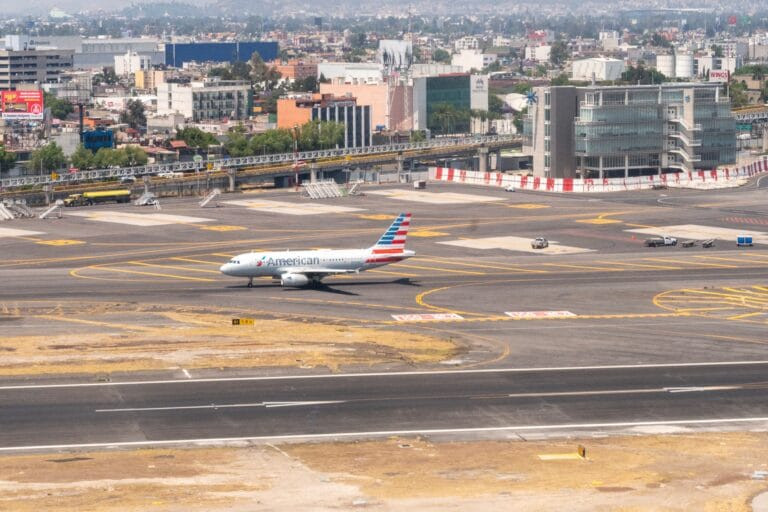- US DOT enforces against Mexico’s cargo airport relocation: Following Mexico’s 2023 move of US all-cargo carriers from Mexico City (MEX) to Felipe Ángeles Airport (AIFA), the US Department of Transportation has implemented Part 212 and 213 orders and a show-cause order targeting antitrust immunity for Delta–Aeromexico.
- Cross-border trade disruption: The relocation has increased transit times and costs for US exporters, affecting industries from automotive to agriculture. Air cargo volumes dropped 5.2% in Mexico in H1 2025, with AIFA down 14.7 percent and MEX up 5.3 percent, highlighting inefficiencies caused by the policy.
- Economic and regulatory stakes: The dispute underscores the fragility of North American aviation policy under USMCA, with potential long-term effects on supply chain reliability, competitive access, and bilateral trade rules between the US and Mexico.
On 19th July, US Transportation Secretary Sean P. Duffy announced enforcement measures against Mexico’s aviation policy that forced US all-cargo carriers out of Mexico City’s Benito Juárez International Airport (MEX) and into Felipe Ángeles International Airport (AIFA). The relocation, imposed in 2023 with only 108 business days’ notice, was initially presented by Mexican officials as a congestion-relief strategy for the capital’s busy airport. Two years later, however, the promised expansion at MEX has yet to begin, prompting Washington to label the decision anti-competitive and a violation of the 2015 US–Mexico Air Transport Agreement.
The Department of Transportation’s response included a series of enforcement tools. Under a Part 213 order, Mexican carriers are now required to file detailed schedules for all US flights. A Part 212 order requires prior DOT approval before any large passenger or cargo charter flights can operate to the United States. Perhaps most significantly, a show-cause order proposed withdrawing antitrust immunity from the Delta–Aeromexico joint venture, limiting the carriers’ ability to coordinate pricing and schedules.
Why it matters
The impact of Mexico’s relocation policy extends beyond aviation law and deep into trade. Mexico is the United States’ largest goods trading partner, with two-way trade reaching US$840 billion in 2024, according to the Office of the US Trade Representative. When air cargo lanes are disrupted, the effects can be felt in industries ranging from auto manufacturing to agriculture.
For US exporters, the loss of direct access to MEX has been especially costly. MEX is situated near Mexico City’s financial and industrial centres and is connected to the nation’s most developed ground distribution network. By contrast, AIFA lies more than 20 miles north of CDMX. The additional transit time raises costs and reduces reliability, particularly for businesses that compete on speed.
Impact on Mexican business
Mexican manufacturers have also felt the strain. Automotive and electronics plants, which depend heavily on timely imports of US components, have reported interruptions as cargo shipments are rerouted through AIFA. The country’s export economy, which accounts for over 40 percent of GDP, is vulnerable when air connectivity falters. Official data underlines the stress. Mexico’s total air cargo volume fell 5.2 percent in the first half of 2025 compared with the same period in 2024, sliding from 620,483 to 588,461 metric tonnes.
AIFA, the very airport positioned to take over cargo operations, saw volumes drop 14.7 percent year-on-year. Meanwhile, MEX, despite losing US cargo carriers, reported a 5.3 percent increase, handling 121,866 metric tons during the same period.
Carrier and government responses
Some US cargo carriers have welcomed the DOT’s actions. The Cargo Airline Association applauded the move, calling it a necessary defence of competitive access to Mexico’s market.
Others, like Delta Air Lines, however, voiced concern over the DOT’s plan to revoke its antitrust immunity with Aeromexico, warning that the decision “would cause significant harm to consumers, US jobs, communities, and transborder competition.”
Mexico’s president, Claudia Sheinbaum, rejected Washington’s framing of the issue, insisting there was “no reason” for sanctions and defending AIFA as a long-term solution.
Other Mexican carriers have struck a more conciliatory tone. Volaris CEO Enrique Beltránena told reporters he was optimistic that a compromise could be reached within days, signalling the industry’s preference for dialogue rather than escalation.
Looking ahead
Beyond the immediate disruptions, this dispute highlights how fragile cross-border aviation policy is in North America. The US, Mexico, and Canada are bound by the USMCA framework, which was designed to boost deeper integration of manufacturing supply chains. Aviation plays a crucial role in that system, particularly for high-value and time-sensitive goods.
The US Department of Transportation’s targeted enforcement may end up forcing Mexico back to the negotiating table. But if the dispute drags on, it risks setting a precedent that airport access can be reshaped by political decree rather than market needs. For US and Mexican businesses that depend on speed, predictability, and efficiency, the outcome of this standoff will shape not only bilateral cargo flows but the credibility of cross-border trade rules for years to come.





